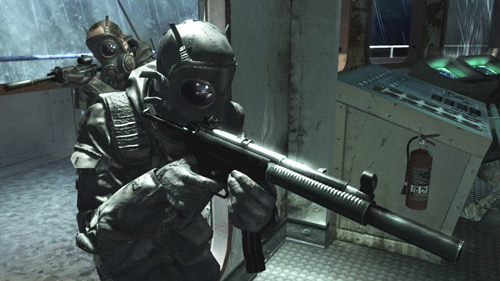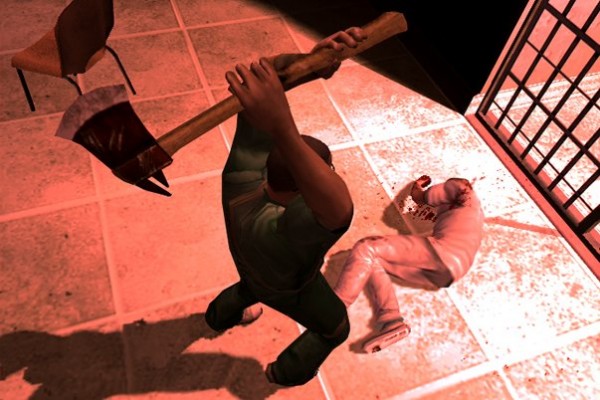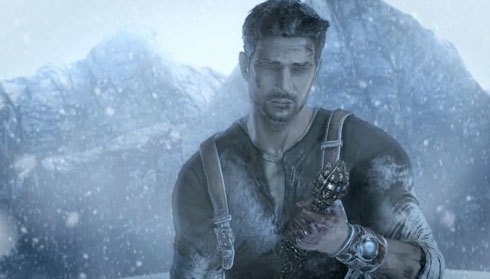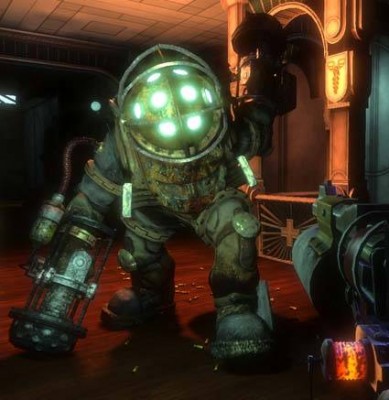
So, the biggest title this season finally drops. The successor to 13-million-strong-in-sales Call of Duty: Modern Warfare is finally out, sans the Call of Duty prefix, marking a true beginning to a new IP and, possibly the birth of yet another gaming related but general-population-targeting controversy.
Unless you’ve been living under a rock (or failing to read Tap-Repeatedly) in the last couple of weeks, you are aware just what we’re talking about here. In one of the introductory missions of Infinity Ward’s latest, shiniest first person shooter, entitled Modern Warfare 2, you, the player are stepping into the shoes of a covert agent infiltrated into a stereotypical terrorist group. To make sure you bring their evil deeds to an end and let the goodTM once again reign supreme on earth, you are supposed to put up with some of their usual activities without enforcing law and order (which would be your primary objective otherwise).
Of course, their usual activities include shooting an airport full of people to bloody, messy death.
(Before you click for more, be warned: if you’re really uninformed or really anal, the following article contains mild spoilers.)
Now, the nature of this controversy has been tackled by Steerpike in the article linked above, but after playing the mission in question I am kind of in two minds about the whole thing. For one, I simply don’t think that the controversy is controversial enough.
Now, look here, I am a reasonable person (despite the looks) and I do understand that the largest blockbuster of the season is never supposed to be the one to be the most thought or at least temper provoking. But can we, the thinking gamers of this world at least keep our panties on?

Yes, what is somewhat shocking about this particular mission in Modern Warfare 2 is the level of graphical detail. Remember, you’ve killed whole cities in your gaming career and, if you’re like us, you’ve grinned genocidally watching mushroom-cloud epitaphs to thousands of nameless lives you’ve just terminated. What Modern Warfare 2 does is not exactly put names to those lives, but Infinity Ward does at least give faces to people dying pointless, ugly deaths.
The set up is exactly as the ‘80s action cinema had us believe these things happen: a bunch of immoral terrorists strolling leisurely through the airport, shooting automatic weapons at civilians who are screaming, running away in fear, begging for their lives, praying to be spared etc. The contrast between people in mortal fear and people appearing to have fun doing their job is, of course horrifying. No game to date made killing unarmed civilians so detailed, so lifelike, or, more precisely, so movielike.
The issue is even more complicated because this is not a cutscene. The player playing the game is one of the terrorists (albeit, actually, on the side of angels, but in deep, deep cover) and the player is also given firearms as well as the command to kill everything that moves. So, after all those games where you were the one saving the world from scum like this, you are supposed to play your role (because of higher interests, of course) and join the killing. You are supposed to aim your gun at harmless, unsuspecting, crying people and pull the trigger.
Now, judging by the stuff people write on the Internet in relation to this mission, this is something you don’t normally do in games. You kill, yes, but only when it’s justified. This is what we tell ourselves and this is why we can justify to ourselves all those kills in all those games.
Which is scary as the justification used in games is exactly the same as justification used in the real world when sending troops across the ocean to kill nameless, faceless indigenous peoples. Sure, that guy you just dropped in your game of Call of Duty or Splinter Cell or Crysis is your enemy. He never saw it coming and you killed him in cold blood, but trust us, he would have killed you if he’d seen you first. How do we know? Things just work that way!!! Sure, he may have had a beautiful wife running a shelter for parentless children at home and perhaps he was a Buddhist who would never even shoot back at you (because, you know, some of the AI we’ve seen in games over the years certainly acted that way even after we dropped their whole squads in front of their very eyes), but goddamit, stop this, we are right and you are wrong and you have to kill if you want to go ahead, this is just how things work and that makes it justified.
Yes, the combined body count from the games I have played in the last 25 years has probably passed the hundred thousand mark somewhere around the time Left 4 Dead dropped – hell, I killed over 1600 people in my first playthrough of Soldier of Fortune alone – but those were all justified kills. My life was threatened. Or the fate of the world was hanging on a thread and I was the only person with a full clip and testicles sufficient for the task at hand. So, all those kills – they are OK, you see, because they were either in self defense or for the greater good.
But what greater good can justify slaughtering dozens of commuters on an international airport asks Infinity Ward without actually saying those words. Instead, they make sure to explicitly ask you (more than once) whether you want to skip this mission. No penalty, no bad conscience either.

Now, from the, let’s call it general population viewpoint, this is a sensible, almost mature approach. Yes, the controversial stuff is in there, but the player is not forced to play it. And since the game does not penalize you for skipping this mission, it is as if to say “No worries, buddy. You’re still a good person.”
However, from a gamer’s viewpoint, I really have to ask myself: is having a game let you skip part of the gameplay (and an important part of the story too!!) actually good design??? I suspect the answer is somewhere between “hell” and “no”.
Because, yes, as stated before, Modern Warfare 2 lets you kill harmless civilians and displays the spectacle of slaughter in unprecedented cinematic detail. But, and don’t let this one be forgotten so easily this time around: games are NOT movies.
Yes, I appreciate narrative in games and I absolutely love big cinematic moments in games. But let’s not forget that at the end of the day it is gameplay what I am here for and no amount of cinematic detail can ever replace gameplay.
In gameplay terms, I fail to see Modern Warfare 2’s controversial mission as being particularly controversial. Yes, killing people who do not kill you back is supposed to be controversial, but, hang on there a second, I did exactly the same thing in Uncharted 2 the other day. It was during one of the early missions, we were sneaking through a museum in Istanbul and, despite using tranquilizer guns to put unarmed guards to sleep, I actually killed one of the guards by pulling him from the rooftop into the gaping abyss and onto the hard, unforgiving street below. It was a scripted moment too, I know that because I tried reloading and doing things differently, but the result was always the same.
So, the character who I was controlling in the game, who minutes before that expressed concern about having to kill innocent museum guards, killed a man. A man who was not threatening him in any real way, a man who was not even aware of his presence. My character did it because I told him so, and because this was more convenient to him (my character) than finding another route through the museum, the one not involving killing an innocent person.
Now, I am picking Uncharted 2 rather than Manhunt 2 for this example because the latter game makes a point of killing harmless or unaware or basically innocent people. No matter how loudly we may be screaming “Exploitation!!!” and pointing our fingers to Manhunt 2, that game’s narrative revolves around making an ordinary guy into an immoral killing machine so in the context of that game, killing innocent people is logical, if not ethically justified. But Uncharted 2 is basically a family friendly action adventure, right? Right?

The shock that Uncharted 2’s casual murder of the mentioned museum guard is so… shocking precisely because it’s hardcoded into the game. There is no way to avoid this murder (aside from not playing the game beyond certain point) and it grates particularly hard because it’s totally out of character. Nathan Drake, the protagonist of Uncharted games does tend to kill a lot, but these are all justified kills. Or at least, they are justified if we follow the reasoning we mentioned above. Usually, Drake kills those who try to kill him or threaten to kill his friends, or threaten to kill the world etc. Killing a seemingly random NPC and not even talking about it afterwards is simply… murder.
Now, there was another game that had you kill an unarmed, defenseless character in a totally scripted, hardcoded scene. This game is called BioShock and, not surprisingly, this part of the game came through as a rather deep and intriguing (meta)comment on the nature of gaming, freedom in games and gaming habits. BioShock didn’t let you step away from the murder your character committed and it certainly didn’t let you skip it. You were watching your character murder someone (as opposed to watching him just kill, in the rest of the game) despite the fact that neither you nor your character wanted it.
But not Modern Warfare 2. True to the spirit of Call of Duty franchise (where it still belongs despite shedding the name), Modern Warfare 2 is the game of set pieces, scripted and hardcoded and any illusion of the world it might be creating is crudely shattered once you decide to go against the rules.
Case in point: I tried playing this mission so that I don’t have to shoot any civilians. I just walked, watching my terrorist comrades mow down dozens of screaming people (shooting either of them makes you fail the mission) and of course none of them reacted. They are, after all, scripted to kill, not to observe.
However, managing not to kill one civilian is pointless since, as soon as the police/ airport security reaches the scene, there is no way out of the mission but kill. The game, in the true Call of Duty fashion will continue respawning enemies until you shoot (or pumell) enough bodies that you can step over an invisible trigger and move the script further. As the script is set so that no matter how long you wait, your comrades can not kill enough enemies to make you walk over the trigger safely, you have no choice but to kill law enforcement troops in order to finalize the mission.
And this is exactly where the catch is. This is not controversy. In terms of game mechanics this is just ancient game design.
Controversy should relate to ethics, I believe, because this is exactly what is being addressed in all those writeups about this mission – the ethics of killing unarmed people (whom, as demonstrated you’re not required to kill by the game). Ethics exist only where there is choice. Good and evil (or at least good and bad) make sense only if you can choose between them. Choice is the foundation of ethics and moral.
And Modern Warfare 2, just like Uncharted 2 or BioShock offers no choice. At least not where it matters.

Now, as already said, murdering (as opposed to merely killing) in BioShock or Manhunt 2 has narrative justification. These are games that deal with ugly topics and make you uneasy for a reason (as opposed to Uncharted 2 where murder is vehemently out of place on all conceivable levels). But Modern Warfare 2 does not improve on this idea. Sure, it renders people dying in more graphical detail but to believe that this equals to pushing the envelope of gaming as an interactive, visual and narrative medium is close to admitting that games would be better if they were movies.
Modern Warfare 2 is, in gameplay terms, as controversial as Space Invaders. Both games require you to kill in order to progress and neither game leaves you any choice in ethical terms. The only choice is not to play the game – that is, to be taken out of the immersive environment of the game by making a real world choice – only in Modern Warfare 2’s case, this is camouflaged by giving the player the option to skip the mission in question. The end result is the same: you make your ethical choice through refusing to engage with the game’s mechanics.
Which is a defeat of sorts for gaming as a medium of any kind. Shouldn’t games address ethics through gameplay, not through abstaining from it? Shouldn’t games marked with an 18, such as Modern Warfare 2 be about allowing the player to make a choice that requires playing through content and bearing the consequences?
Because, you see, all those justified kills from all those other games you played – their justification in narrative terms is meaningless (meaningless, I say!!) if there’s no underlying game rule that says “you HAVE to kill in order to progress”. This, and not the narrative is what makes those kills justified. This is, then, the point we should be addressing if we mean our games to move forward in terms of narrative and ethics. Because gameplay is king and game rules define gameplay. Letting the player not play the game and pretending this is somehow an ethical choice in harmony with the game’s rules is just wrong.
Because, when all is said and done, people have shat all kinds of crap all over Grand Theft Auto for giving the player the ability to hire then kill prostitutes and take the money back, but Grand Theft Auto never once made you do it. You could do it, but you were not required to. And, yes, you suffered a small penalty in terms of the game economics if you didn’t do it. But the game was perfectly playable and enjoyable even if you didn’t. So, did you do it?
I know I didn’t. Nor once in all those GTA games. Because I was given meaningful choice and freedom to choose and bear the consequences. And then and there, for a short period of time I was an ethical being. Alas, in 2009, playing (admittedly fun) Modern Warfare 2, I am just another first person shooter.


This is a wonderful take on a game I have yet to play, but am looking forward to – partly because I’m very curious about how this particular scene will affect me.
In some ways, I feel the revelation that your character in this scene is a “good” guy actually weakens it. One of the things that differentiates games from movies is that you become the character, so in making you become a character who guns down innocents, IW would be making a powerful statement and giving their game increased gravity.
Of course, Meho is right. People squawk about this game, but hell… Thief, Defcon, Half Life, Fallout, GTA, STALKER, Daggerfall, Morrowind, Oblivion, World in Conflict, X-Com, Summoner, Pathologic, Max Payne, Caesar, Deus Ex – and that’s just off the top of my head – I’ve killed innocents in all of them. In some cases, like Defcon, I cackled and did it again; in others, like Thief, I felt remorse but did the murder anyway because it made the game easier for me; in others still, like Deus Ex or X-Com, it was an honest accident or something with true emotional effect.
We kill in games. Killing in games is a powerful proxy for momentum. And while many games make a point to indicate that the killing is of those who are “evil” or threaten you/your girlfriend/the world/etc., perspective comes into play. Let’s not forget that Battlefield 2, not to mention about a bazillion other games, is about Westerners killing Muslims. Or that Call of Duty: World at War is about Americans killing Japanese. I suspect the Muslims and the Japanese might well resist the idea that they’re the enemy, and yet in those cases, in the west at least, it’s all okay.
If they had really wanted to push the envelope they shouldn’t have made you an inflitrated “good guy”, they should have created two different campaigns where you play both the terrorist and the “good guy”, like the separate Russian/British/American campaigns of the original COD.
They could have put you in the shoes of an Iraqui who lost everything in the last war and joins a terrorist organization out of vengeance, or an actual religious nutball who trully believes what he’s doing. That’s what thought provoking movies and books have been doing for ages and games have to do it sooner or later. Allowing you to skip the mission or just complete it without firing a shot sounds a little bit coward.
And since X-Com was mentioned above, I always thought an X-Com style game set in, for example, the Spanish Civil War would really force you to deal with the kind of moral choices books or movies have been dealing with forever and games haven’t addressed yet. And a game can force you to evaluate those choices in ways that movies and books can only dream about. The game forces you to do or do not do something to continue, and then live with it.
In a book or movie you read or watch what the character is doing and thinking. Great books and movies manage to put you in the character’s shoes through your imagination, but a game makes you BE that character. You can read about atrocities during the Spanish Civil War in For Whom the Bell Tolls, but in a game about it you would be ordering them, carrying them on, from both sides, living with the consequences… How do you convert villages to your cause? Do you burn churches for the communist side, do you shoot poor peasants for the facist side? How can those decisions make you think about the real world where there’s never a clear line between good guys and bad guys?
I really enjoy the games that let me be “the bad guy” or slaughter hundreds of innocents at my own discretion. I don’t like morality forced upon me in games. I may actually have a sort of vendetta against the innocent civilians found in games. They need to give me a reason to let them live or suffer my whims. I remember so many old games where you always played the hero out to save the princess/world/galaxy, and an NPC would get in the way of something I was trying to achieve. Usually it was because I did something off the wall in my quest to find every little bit of secret content possible, and the NPC AI would plant them directly in my path with no option other than to leave and return to reset the area. Oh how badly I wanted to kill those little bastards! Now thanks to advancements in gameplay I can have my revenge!
Absolutely brilliant article. I loved reading it and it instantly transformed me into a huge fan of this blog.
When I saw the No Russian scene on the net (I have yet to play the game which I ordered online while in a drunken haze – really) I could not understand why people were making such a huge deal out of it. I felt this because mainly, in game terms, you are justified in doing so. As you aptly explained, no choice was involved and there is no way to save the by standers. Shoot the terrorists and it’s game over.
Most games force me to play the role of someone else. If I am playing the role of an undercover operative that has to kill in cold blood then so be it. If the game puts me in the shoes of a mass murderer who kills for entertainment then I feel justification in my actions – not because the virtual victims deserve to die – but rather because the game already defined what I should be doing, how I should play my role. Even in a game like GTA IV, where I was given the choice to spare civilians, I still did not find it that difficult to run over hapless pedestrians just because I was Niko Bellic and Niko is such a cold character (You’re cold man!).
Compare this to a game like Bioshock where I was given the option to save, or harvest, the little sisters. I could not force myself to harvest them simply because the game did not define my character for me. In that game I was a characterless individual (without even a name), put in a mind boggling situation. I found it much easier to project my own character onto the hero of the game. All this served to make the reveal near the end that much more unnerving.
This is why a game like Bioshock did so much for the medium as a whole whereas something like Modern Warfare 2 is just another (very polished) shooter. Yet despite this I applaud Infinity Ward for being able to elicit reactions of disgust, anger and frustration (in a good way) from the people playing that section of the game. Too few games manage this.
Yep. They even managed to have it pulled from shops in Russia. Apparently someone high enough in the administration over there didn’t really take kindly to having a stage where you kill an airport in Russia, disregarding the fact that you can skip that mission or, as explained, can choose not to shoot civilians because the game is designed in a funny way. As far as I ca understand, the game will be back on shelves as soon as IW/Acti cut the mission in question out and repackage the game. It will be funny once that someone in the administration realises two things:
1) The censored game will still have the content, albeit commented out in the code (just like Hot Coffee in the original cut of GTA SA) so anyone savvy enough will be able to have it back in the game and patches to enable this mission will be available after a couple of days.
2) Valve is going to get another shit-caneing session from gamers, this time Russian ones, when they enforce patches to remove the mission in question from Steam-purchased copies (or all copies, since they require Steam anyway) for all the Russian IP’s logging into Steam.
Of course, you are right about BioShock. You could criticise that game for many things – and a rather lacklustre implementation of choice between harvesting and saving Little Sisters in terms of the game economics is certainly one of these things – but the way it gave you all that choice all the time and then took it away from you in that twist and showed you what a puppet on a string you were all along, that was certainly one of the defining moments of gaming in the now-gen.
A great article on the same issue by Kieron “Phonogram” Gillen over on RPS: http://www.rockpapershotgun.com/2009/11/19/wot-i-think-about-that-level/#more-21358 Kieron makes a lot of the similar points but is amuch better writer than me, I’m pleased to say.
Hey Meho, I thought this was one of the best articles I’ve read about No Russian, second only to Kieron’s 😉 I’ll have a read of the comments above and try and post my own thoughts at some point.
Well, thanks, Gregg. Maybe now Marvel can offer ME to write Beta Ray Bill, Since Kieron’s moved on to Thor, heh heh heh.
The thing is, that twist in Bioshock featured much earlier in System Shock 2, albeit more elaborate and refined but it accessed a much wider audience. What interests me is that Infinity Ward can’t even handle a subject this sensitive properly within the confines of a multimillion dollar production so whats worse this or Hit the Bitch?
I haven’t played MW2 but I’d like to think for such a big title that deciding against killing civilians and taking out the terrorists would open up another arc of the story with perhaps worse repercussions for not seeing the bigger picture. Merely standing and not killing could have instigated a scenario where a terrorist presents you with a civilian close up and personal so that the decision making is really notched up in the face of your inability to act.
I thought GTA IV was a pile of shit but the best moments in it were when you had to choose which characters to whack because it suddenly made you consider all their traits and examine your own morality against a lawless background. These moments stuck with me and made for great discussion with friends who had taken alternative paths.
SPOILER:
When the decision came to kill Dwayne or Playboy, I went for Playboy which was quite a fight involving a rooftop chase and reinforcements from his homies as well as a ton of abuse. All this gave me the ability to kill him with no restraint. My friend chose to kill Dwayne because Playboy was a powerful ally. Killing Dwayne was an effortless execution that took place in the kitchen in his run down flat. He said it was horrible.
END SPOILER.
This is perhaps one of the defining moments for me this gen yet it was surrounded by a game that relied on cheap shootouts/action sequences and linear mission structuring. The gameplay was largely at odds with the strong writing. I’d like to see interactivity force players to make tough decision with real consequences rather than a rollercoaster ride that starts at A and rigidly ends at B. Planescape: Torment featured these head scratching decisions and it really defined the experience.
I don’t want black and white decisions, I don’t want good and bad. I want all the shades in between so I’m provoked on a much deeper level.
You speak wisdom, my friend.
Absolutely, Gregg. When I’m questioned about the “shades of gray” issue in game decisions, I always turn to Planescape Torment as the shining example. No other game has come close to it in this matter.
I remember sitting, staring at dialogue choices, three minutes stretching into ten, trying to decide what the “best” response was. Over time I de-evolved back into my tabletop roleplaying days, and simply said what my character would have said. The result was a genuinely rich RP experience that hasn’t yet been beat.
Stuff like that takes more effort to think up, though, and it seems that even Bioware doesn’t bother with such things.
Of all places, IGN has a pretty interesting article trying to cover ethical issues related to MW2: http://pc.ign.com/articles/105/1053779p1.html
Personally, I agree with Mike, but I’d think twice before actually writing such an editorial. Not being American, I’d probably sound anti-American and, you know, hostile. But this guy’s American, so… good read.